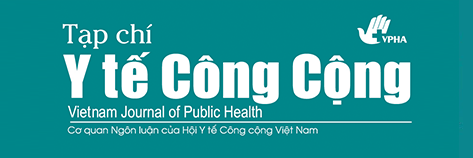Nghiên cứu thăm dò tính khả thi của chương trình can thiệp “Trẻ em nói không với hút thuốc thụ động” (An explanatory and pilot study for the intervention program “Children say no to secondhand smoke”)
Tóm tắt
Các nghiên cứu trên thế giới đã cho thấy trẻ em có vai trò rất quan trọng trong các chương trình can thiệp được thực hiện tại cộng đồng. Trẻ em, với vai trò tác nhân thay đổi hành vi, có thể giúp gia đình và cộng đồng thực hiện các hành vi có lợi cho sức khỏe. Tại Việt Nam, đã có khá nhiều chương trình can thiệp có sự tham gia của trẻ em và cũng đã thu được những thành công nhất định. Tuy nhiên tại Việt Nam hiện chưa có một chương trình can thiệp nào trong đó trẻ em đóng vai trò chủ đạo trong việc cung cấp kiến thức và hành vi có lợi cho sức khỏe cho các thành viên khác trong gia đình, giúp gia đình thực hiện những hành vi có lợi cho sức khỏe. Nghiên cứu can thiệp này được xây dựng với mục tiêu cơ bản là tạo một môi trường gia đình lành mạnh không có khói thuốc lá cho trẻ em. Trước khi tiến hành nghiên cứu can thiệp, chúng tôi thực hiện nghiên cứu thăm dò tính khả thi của chương trình can thiệp “Trẻ em nói không với hút thuốc thụ động” và thu được một số kết quả khả quan: Mặc dù thực trạng trẻ em phải phơi nhiễm với khói thuốc lá thụ động khá phổ biến trong cộng đồng, nhưng cộng đồng có thái độ tích cực đối với chương trình can thiệp được đề xuất và sẵn sàng tham gia; Cả phụ huynh học sinh, giáo viên đều tin rằng học sinh có thể thành công trong việc vận động người thân không hút thuốc lá trong nhà, trẻ em cũng có thái độ tích cực và rất hứng thú với chương trình can thiệp.
English abstract
Research has shown that children play an important role in community-based intervention programs. Children, as change agent, can assist their family members and communities to adapt healthy behaviors. In Vietnam, there have been many intervention programs with children’s involvement and were implemented successfully. However, there is no intervention in which children – as change agent – have central role in providing healthy knowledge and behaviors for other members in their families and assist their family members to conduct those behaviors. This intervention program ‘Developing a trial intervention model Children Say No to Secondhand Smoke’ is designed with the overall aim of creating a home enviroment free from secondhand smoke (SHS) for children. Prior to the study, we conducted an explanatory and pilot study and found some results as follow: (1) The situation of children exposed to SHS was still popular among the community, (2) community showed their support to and willingness to participate in the proposed intervention; (3) both parents and teachers believed that students could be able in persuading their parents and other smokers not to smoke in-home; and (4) children showed the positive attitudes toward and was very interested in the intervention.
Từ khóa
Toàn văn:
PDF (English)##submission.citations##
DHHS, The health consequences of involuntary exposure to tobacco smoke: A report of the Surgeon General. 2006, U.S. Department of Health and Human Services, Centers for Disease Control and Prevention, Coordinating Center for Health Promotion, National Center for Chronic Disease Prevention and Health Promotion, Office on Smoking and Health: Atlanta, GA.
WHO, International consultation report onenvironmental tobacco smoke and child health. 1999, World Health Organization: Geneva. p. 29.
Bộ Y tế, Điều tra Y tế quốc gia 2002. 2003, Bộ Y tế: Hà Nội.
Minh, H.V., P.T.H. Anh, and L.T.T. Huong, Study on the association between secondhand smoke and respiratory health of children under 6 years of age in Vietnam. 2007: Hanoi.
Wipfli, H., et al., Phơi nhiễm thụ động với thuốc lá ở phụ nữ và trẻ em tại gia đình. Tạp chí Y tế công cộng, 2009. 12: p. 46-51.
Rohde, J.E. and T. Sadjimin, Elementary-school pupils as health educators: Role of school health programmes in primary health-care. Lancet, 1980. 1: p. 1350-1352.
Onyango-Ouma, W., J. Aagaard-Hansen, and B.B. Jensen, The potential of schoolchildren as health change agents in rural western Kenya. Social Science & Medicine, 2005. 61(8): p. 1711-1722.
Bowen, A., et al., A cluster-randomized controlled trial evaluating the effect of a handwashing-promotion program in Chinese primary schools. Am. J. Trop. Med. Hyg., 2007. 76(6): p. 1166-1173.
Winch, P.J., et al., Community-based dengue prevention programs in Puerto Rico: Impact on knowledge, behavior and residential mosquito infestation. Am. J. Trop. Med. Hyg., 2002. 67(4): p. 363-370.
Siddiqi, K., et al., Smoke-free homes: an intervention to reduce second-hand smoke exposure in households. Int J Tuberc Lung Dis, 2010. 14(10): p. 1336-1341.
Alwan, N., et al., Can a community-based ‘smoke-free homes’ intervention persuade families to apply smoking restrictions at homes? Journal of Public Health, 2011. 33(1): p. 48-54.
Bùi Thu Trang, et al., Xây dựng mô hình can thiệp "Ngôi nhà không khói thuốc" tại xã Chi Lăng Nam, huyện Thanh Miện, tỉnh Hải Dương. 2006, Trường Đại học Y tế công cộng: Hà Nội. p. 75.
Bùi Thị Phương Nga, et al., Tự nhiên và Xã hội 3. Tái bản lần thứ sáu ed. 2010, Hà Nội: Nhà Xuất bản Giáo dục Việt Nam. 132.
Bùi Phương Nga and Lê Việt Thái, Khoa học 5. Tái bản lần thứ ba ed. 2010, Hà Nội: Nhà Xuất bản Giáo dục Việt Nam. 148.
Nguyễn Khắc Hải, et al., Hiệu quả dự án "Làm sạch bầu không khí ô nhiễm khói thuốc lá: Tạo môi trường lành mạnh và an toàn cho trẻ em" Tạp chí Y tế công cộng, 2006. 6: p. 41-46.
Nga, P.T.Q. and L.T.T. Ha, Evaluation of the effectiveness of the project 'Reducing social acceptability of smoking in Vietnam'. 2007, Vietnam Public Health Association & Health Bridge Canada: Hanoi. p. 91.
Hai, N.K., et al., Effectiveness of the project "Creating a healthy and safe environment for children by cleaning the tobacco polluted air". Vietnam Public Health Journal, 2006. 6: p. 41-46.
Nichter, M., R.S. Padmawati, and N. Ng, Developing a smoke free household initiative: an Indonesian case study. Acta Obstet Gynecol Scand, 2010. 89(4): p. 578-581.
Lưu Thị Thủy, et al., Đạo đức 2. Tái bản lần thứ bảy ed. 2010, Hà Nội: Nhà Xuất bản Giáo dục Việt Nam. 48.
Lưu Thu Thủy, et al., Đạo Đức 3. Tái bản lần thứ sáu ed. 2010, Hà Nội: Nhà Xuất bản Giáo dục Việt Nam. 48.
Lưu Thu Thủy, et al., Đạo đức 4. Tái bản lần thứ năm ed. 2010, Hà Nội: Nhà Xuất bản Giáo dục Việt Nam. 44.



